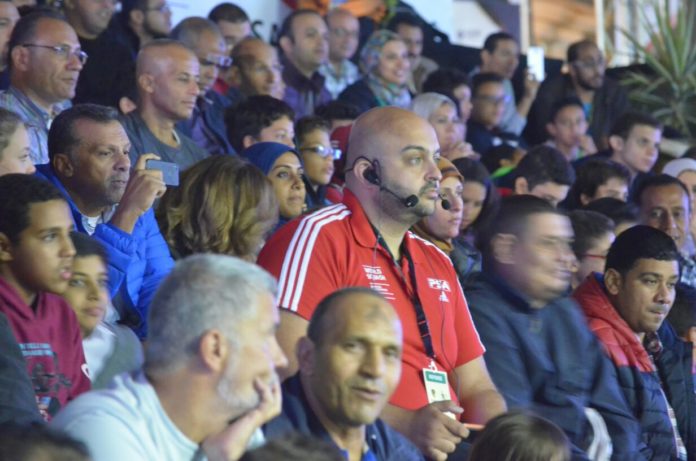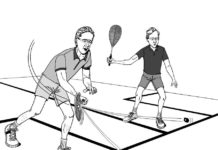U.S. Pro Tour Tier 2 referee Tammer Alnaggary spoke with Squash Magazine about becoming a squash referee and his work in the U.S. with junior, college and professional tournaments.
Squash Magazine: How did you get your start as a referee?
Tammer Alnaggary: My refereeing career began in Cairo, Egypt when I was in my early twenties. It was during the whole Ahmed Barada craze around 1996. I started playing squash., and right from the start I fell in love with the sport. I was a decent level club player. I was fortunate enough to be a member at the Maadi Club which produced many elite pros like Barada, Darwish, Elborolossy, Shabana, Mosaad, Khalifa and Kawy. I was able to watch world-class squash daily. As I watched these practice matches, the players sometimes asked me to give decisions when interference happened. I began to referee at local tournaments and worked up to the national tournaments. Eventually I was selected as a marker for the iconic Al Ahram International by the Pyramids. In 2004 my career as an IT professional brought me back to the U.S. I wanted to stay involved in refereeing and that year had the opportunity to referee at the Tournament of Champions. Fifteen years later, here we are.
SM: You officiate both juniors and college matches. How are they different?
TA: I find that junior events are good training grounds for officials to put their basic refereeing skills to the test. The pace and pressure of matches isn’t as high as a pro event. It’s also provides referees the opportunity to interact at an early stage with players, coaches and parents to build common expectations of how decisions are made and what everyone’s responsibilities are. Collegiate play is absolutely electrifying. As a referee I don’t think I’ve experienced anything like it before, except perhaps 4,000 roaring spectators at the Al Ahram when Barada was on court. The adrenaline and energy means that as a referee you must be on form to manage the conduct and atmosphere of the players, the teams and the fans—dealing with dissent, racquet or ball abuse, crowd management and excessive physical contact. Those issues are generally secondary, however, to the amazing atmosphere and quality of squash in U.S. colleges right now.
SM: From your perspective as the head tournament referee at the 2019 FS Investments U.S. Open, what are your takeaways on the current status of officiating at the professional level?
TA: The U.S. Open is a global presentation to spectators on how the game should be played and refereed. At the PSA level, most players usually have a good understanding of the rules and know what the referees expect from them. Nowaday because of the technological advancements in live streaming, everything is monitored which increases the pressure to get everything right in all facets of the game. Use of video reviews by the PSA has helped our cause tremendously—at the end of the day our goal is to reach a fair outcome for each decision. Also, major events bring many top officials together at one time to learn from each other. One of the most valuable things we do at most PSA tournaments like the U.S. Open is hold daily meetings to review past decisions and our approach to officiating.
SM: Officials are placing increased emphasis on awarding “positive” decisions—more strokes and no lets in lieu of just lets—in the cases of movement off a shot and effort to get to the ball. Are you seeing that affect the way the game is played?
TA: Squash is one of the most difficult sports in the world to referee—the two players are close together in a high-paced environment. Referees are now looking to give more decisions that positively influence the flow of play. If a player hits a shot they can’t clear or looks to create interference then they are being penalized with a stroke or no let. A dozen years ago, a lot of these stoppages resulted in a let, taking away from the enjoyment of the match. Now, players are keener to play good hard squash rather than look for an opportunity for a let.
SM: What does your upcoming season look like?
TA: I’m going to junior, college and professional events to referee and to mentor other officials. Some of my best moments as a referee have been a result of learning from some of my worst ones. I always advise other referees to re-watch their matches and understand what they could have changed—there is always room for improvement.





